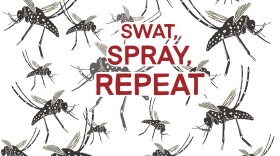
Elizabeth Friend
Producer/ Co-Host, "CREEP" PodcastElizabeth Friend grew up in North Carolina listening to public radio in the backseat of the family station wagon. She has been reporting and producing at WUNC since 2016, covering everything from Army history to armadillos. She's also the co-founder of the beloved summer event series Audio Under The Stars. In her spare time she enjoys exploring the outside world with her family, dabbling in esoteric crafts, and cheese.
-
What do you do when you’re stuck at home during pandemic lockdown with thousands of mosquitoes to keep you company? You feed them. The hard way.
-
Backyard spraying is a common quick fix for dealing with pesky mosquitoes. But this short-term solution may come with some unintended consequences, including making some mosquitoes harder to kill.
-
Iguanas didn’t always fall out of trees during cold snaps in the Sunshine State, but chances are, future generations will regard them as just a natural part of the landscape. With the world changing around us at a rapidly increasing rate, how do we set conservation goals when we can't keep track of what we’ve lost?
-
The exotic pet industry is one of the main pathways for introducing invasive species into new environments. It can be hard for non-herpers to understand what’s so attractive about living with these creatures. In this first of a series of bite-sized episodes, reptile enthusiast Tim Jackowicz takes us into his world, where giant snakes and lizards offer an opportunity to rethink how we approach the world around us.
-
As if our native mosquitoes weren’t pesky enough, we humans have imported some of the most invasive mosquito species to the U.S., bringing with them painful and debilitating diseases. Is there a human solution to this human-caused problem? Or are we destined to see history repeat itself, as we try (again and again) to outwit the deadliest animal on the planet?
-
Worst. Marine. Invasion. Ever. Prized as pets for their mesmerizing beauty, an aquarium keeper’s dream has become an environmental nightmare as legions of venomous, voracious lionfish are now guzzling up fish and further endangering coral reefs throughout the Atlantic, Caribbean and Gulf of Mexico. Researchers, inventors, divers and fishers are urgently trying to find new ways to stem the tide of these undersea marauders.
-
Beyond the hype about Pablo Escobar’s cocaine hippos, the real story of what’s happening in Colombia’s Rio Magdalena is surprising and complex. Some look on these hungry herbivores with affection and admiration, others fear their aggressive attitude and huge ecological footprint. Follow these unlikely invaders from Africa to Colombia with a possible layover in…Louisiana?
-
If you had to guess the top five largest invasive species in the world, where would you start? And why, exactly, are we moving these behemoths around the globe?
-
Tegus are armed with a metabolic superpower and a powerful appetite for eggs, but they’re also easily domesticated, making them both beloved family pets and unwelcome hungry pests. Throughout the South, these giant lizards are raising eyebrows, breaking hearts and launching lawsuits.
-
Anita is confused about hook up culture. Is it a thing, and if so, who makes the rules? She talks to a recent college grad about her research on the sex lives of her peers, plus a therapist who shares her take on why it doesn't feel as liberating as we think it should. Then she dives into Celibacy TikTok — a space where Gen Zers are committing to being sex-free.







